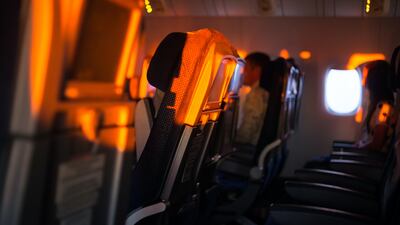The largest US airlines have been working with the Biden administration for months on creating a nationwide no-fly list that would ban from commercial carriers the worst of unruly passengers, as attacks on flight attendants, airport gate agents and fellow travellers increase, Bloomberg News reported on Monday.
Discussions among the carriers, their Airlines for America trade group, the Department of Homeland Security and Transportation Security Administration over the issue have intensified over the last six months or so, two people familiar with the issue told Bloomberg.
Airline unions have also been involved in some of the talks.
The effort highlights the industry’s increasing push for more effective ways of quelling the jump in unruly passenger incidents since a pandemic-era requirement to wear masks on board planes was imposed.
Of 5,981 such reports last year, 72 per cent were mask-related, according to the Federal Aviation Administration.
The agency launched investigations of 1,105 serious incidents last year, more than three times the previous high since the agency began collecting such data in 1995. It has initiated enforcement action in 390 cases since the start of 2021. The current mask mandate is set to expire on March 18.
Over the weekend, an American Airlines plane made an emergency landing in Kansas City on a Los Angeles to Washington, DC, flight, due to an unruly passenger who tried to enter the cockpit, a flight attendants union rep said.
"This violent behaviour must stop," the association said in another tweet on Sunday.
Another American Airlines flight that left Phoenix, Arizona, en route to Honolulu, Hawaii, on Sunday had to return to its originating airport after a "passenger disruption".
The biggest stumbling block for a potential no-fly list has been setting uniform standards for when someone would be included on the list, one of the people said.
Other thorny issues include how to limit cases of mistaken identity; which federal agency would oversee and administer the system, and defining exactly what amounts a full ban on air travel for life.
Transportation Secretary Pete Buttigieg has said a unified no-fly list — including at least some passengers banned by individual airlines — is something the government is considering, though his agency plays no current role in security checks.
Delta has put nearly 1,900 people on its no-fly list for refusing to comply with mask requirements and has shared 900 of the names with the TSA to possibly pursue civil penalties.
United Airlines has banned more than 800 from its flights for refusing to wear a mask.
Southwest declined to disclose how many are on its internal list.
“Obviously, there are enormous implications in terms of civil liberties, in terms of how you administer something like that,” Mr Buttigieg said in an interview on CNN.
“Even when it was over terrorism, it was not a simple thing to set up. So none of these things can be done lightly. But I think all of these things need to be looked at a moment like this.”
Delta CEO Ed Bastian wrote to US Attorney General Merrick Garland on February 3, asking for federal officials to follow up on an earlier decision to prosecute people involved in the most egregious onboard incidents.
Mr Bastian called for “the much-needed step of putting any person convicted of an onboard disruption on a national, comprehensive, unruly passenger ‘no-fly’ list that would bar that person from traveling on any commercial air carrier".
“This action will help prevent future incidents and serve as a strong symbol of the consequences of not complying with crew member instructions on commercial aircraft,” Mr Bastian said.
The TSA is responsible for checking all people who purchase tickets on US airlines against various watchlists compiled by intelligence, law enforcement and homeland security agencies.
The TSA and the FAA announced in December that they were coordinating and some unruly passengers could lose streamlined airport screening privileges under TSA’s PreCheck programme.

